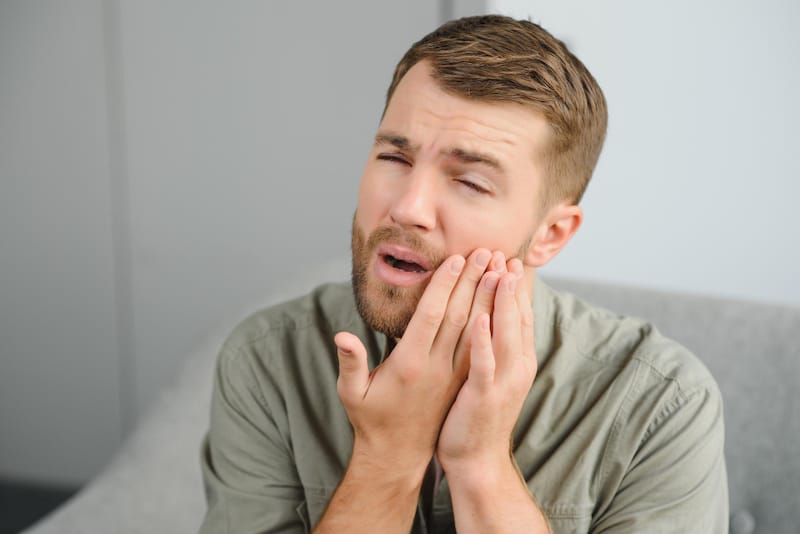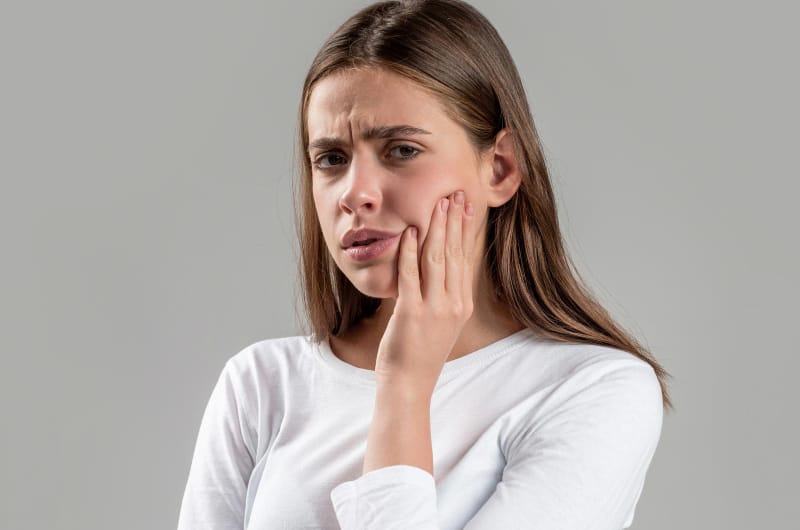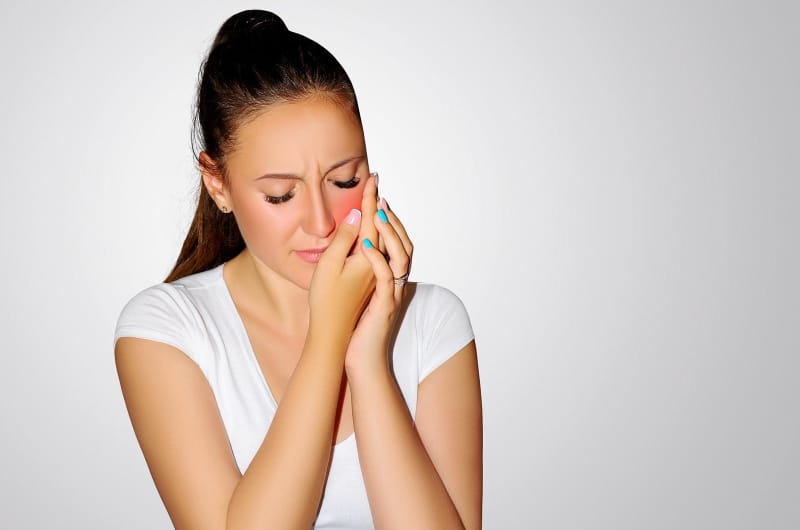The pain that you feel when your jaw cracks whenever you yawn can be caused by a variety of symptoms. Often, it is not a cause for concern. However, if you have any underlying condition like TMD, Arthritis, OSA, MPS, or Malocclusion of the teeth, it is important to have yourself checked by professionals.
Jaw cracking or jaw popping refers to a snapping or clicking sound in your jaw. Sometimes, this happens when you yawn.
The reasons for jaw-popping when yawning are not entirely understood. It’s mostly believed to be a reflexive behavior triggered by stretching the muscles in your throat and jaw.
This reflex may be triggered by yawning, which occurs when you inhale and exhale deeply through your mouth. The stretching of these muscles increases air pressure in your oral cavity, which results in an automatic reaction of jaw popping.
Usually, jaw popping comes with pain and discomfort. It may also be hard to move your jaw. However, jaw cracking is not something you should be concerned about, as it usually happens when you yawn or open your mouth.
Although if you’ve recently sustained some sort of injury on your head or face, it is vital to seek help immediately.
The exception is if you recently sustained a facial injury, which can dislocate or break your jaw. In this case, you’ll need emergency help.
What would cause my jaw to crack?
Here are the potential causes of jaw popping or cracking:
1. Temporomandibular joint disorder (TMD)
Temporomandibular joint disorder (TMD) is a condition that causes pain and inflammation in the jaw.
It’s usually caused by overuse of the muscles that control your mouth, which can be brought on by stress or several other factors.
TMD can come on suddenly—for example, if you bite down hard on something or overuse your teeth to talk or eat.
You may also experience TMD when you yawn or do something painful, like being kicked in the face or hit with a ball.
TMD can cause fatigue and pain in the muscles around your jaw, making it difficult for you to open and close your mouth correctly. It may also cause headaches, sore throat, coughing, and difficulty swallowing liquid foods or liquids at night.
2. Arthritis
When people experience arthritis, the tendons that support the jaw joint become weak or inflamed.

The inflammation can cause pain and swelling in the joint and may result in an inability to open or close your mouth completely.
So, when they yawn, their jaw hurts.
Jaw cracking can also occur if you have had a dental procedure that has caused swelling in the face (such as wisdom tooth removal).
3. Malocclusion of the teeth
Jaw cracking is a common problem among adults. This condition can be caused by malocclusion of the teeth or improper bite.
Malocclusion of the teeth refers to the misalignment of teeth in relation to each other and their position in the jaw.
Jaw cracking can also occur if there is a misalignment between the upper and lower jaw.
The types of malocclusion include:
- Crowded teeth
- Open bite
- Crossbite
- Overbite
- Underbite
4. Obstructive sleep apnea (OSA)
Obstructive sleep apnea is one such cause of jaw cracking that you should be aware of.

Obstructive sleep apnea is when your airway gets blocked because the tongue falls back into the throat during sleep, causing a lack of oxygen flow to your brain.
This can lead to jaw cracking because you may have trouble breathing while sleeping.
5. Myofascial pain syndrome (MPS)
Myofascial pain syndrome is a painful condition that affects the muscles, tendons, and ligaments of the neck, upper back, and shoulders. It often starts with a crick in your neck or shoulder.
The muscles become tight and stiff as they try to hold up your head, which causes them to get injured over time.
Symptoms of MPS:
- throbbing pain in your jaw
- jaw cracking
- painful muscle knots (neck, shoulders, and upper back)
- tenderness of the jaw muscle
- jaw hard to move
- headaches
- difficulty sleeping
6. Infections
Sometimes, your jaw can also pop when you have an infection on any of the following:
- TMJ
- Salivary glands
- Jawbone
Jaw infections are often mistaken for TMD.

If the cracking of the jaw comes with the following, schedule a visit to your physician as soon as possible:
- Difficulty in opening the mouth
- Swelling
- Fever
- Open ulcer
- Weird/abnormal taste in your mouth
- Dry mouth
If you’ve been prescribed medication for TMJD and it is not working, seek your doctor’s advice immediately.
What should I do if my jaw cracks?
To stop your jaw from cracking when you yawn, you should first identify and treat the underlying cause.
Here are some home remedies that may help:
- Over-the-counter medicine (OTC) – OTCs such as nonsteroidal anti-inflammatory drugs (NSAIDs) can help ease jaw pain and discomfort. Naproxen sodium and ibuprofen, in particular, are best for pain relief.
- Say no to hard foods – Eating hard or crunchy food can worsen your condition. Instead, eating softer foods like soup or mashed potatoes is better.
- Manage your stress levels – Practice relaxation techniques, as TMD can be triggered by stress. In addition, you can better manage stress by doing activities such as meditation, yoga, and even regular exercise.
- Stretch and massage – Reduce the tension on your jaw by massaging or stretching it. You can check with a doctor which jaw exercises are best for you.
- Do not overwork your jaw – Chewing gum requires you to chew for an extended period, which can stress your jaw. Avoid doing this as well as singing loudly.
- Hot/cold compress – Heat or ice packs help reduce TMD symptoms and inflammation. Try putting a compress in a clean cloth and applying it to the affected area for 10 minutes.
FAQs
Can TMD go away on its own?
If your TMD flare-up is because of temporary stress, it will likely go away once you are no longer stressed.
However, if your jaw or teeth are misaligned, TMD pain may be a chronic occurrence, which will only improve once you’ve had the proper treatment.
Conclusion
You may experience pain and discomfort when your jaw pops as you yawn. This is typically a regular occurrence unless you have an underlying condition.
If so, it’s essential to check with your doctor immediately.
The potential causes of jaw popping when you yawn are TMD, arthritis, teeth misalignment, OSA, MPS, and even infections.
If your jaw cracks and it is accompanied by other symptoms mentioned above, schedule an appointment with your doctor as soon as possible.


